
Serbo-Croatian – also called Serbo-Croat, Serbo-Croat-Bosnian (SCB), Bosnian-Croatian-Serbian (BCS), and Bosnian-Croatian-Montenegrin-Serbian (BCMS) – is a South Slavic language and the primary language of Serbia, Croatia, Bosnia and Herzegovina, and Montenegro. It is a pluricentric language with four mutually intelligible standard varieties, namely Serbian, Croatian, Bosnian, and Montenegrin.
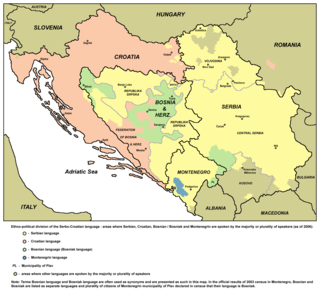
Standard Bosnian, Croatian, Montenegrin, and Serbian are different national variants and official registers of the pluricentric Serbo-Croatian language.
Montenegrin is a normative variety of the Serbo-Croatian language mainly used by Montenegrins and is the official language of Montenegro. Montenegrin is based on the most widespread dialect of Serbo-Croatian, Shtokavian, more specifically on Eastern Herzegovinian, which is also the basis of Standard Croatian, Serbian, and Bosnian.
Radoslav Katičić was a Croatian linguist, classical philologist, Indo-Europeanist, Slavist and Indologist, one of the most prominent Croatian scholars in the humanities.

Shtokavian or Štokavian is the prestige supradialect of the pluricentric Serbo-Croatian language and the basis of its Serbian, Croatian, Bosnian and Montenegrin standards. It is a part of the South Slavic dialect continuum. Its name comes from the form for the interrogative pronoun for "what" što. This is in contrast to Kajkavian and Chakavian.
Mate Boban was a Bosnian Croat politician and one of the founders of the Croatian Republic of Herzeg-Bosnia, an unrecognized entity within Bosnia and Herzegovina. He was the 1st President of Herzeg-Bosnia from 1991 until 1994.

The Croatian Republic of Herzeg-Bosnia was an unrecognized geopolitical entity and quasi-state in Bosnia and Herzegovina. It was proclaimed on 18 November 1991 under the name Croatian Community of Herzeg-Bosnia as a "political, cultural, economic and territorial whole" in the territory of Bosnia and Herzegovina, and abolished on 14 August 1996.
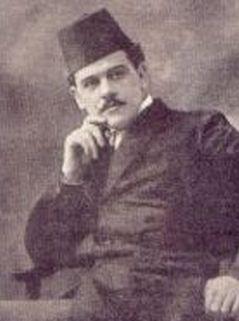
Osman Đikić was a Bosnian and Herzegovinian poet, dramatist and writer. He was born in Mostar, in Bosnia and Herzegovina under Austro-Hungarian occupation. He was educated in Belgrade, Constantinople and Vienna, where he graduated from the Trade Academy. He is penned several sevdalinka songs, including Đaurko mila, Ašik ostah na te oči and Đela Fato đela zlato.
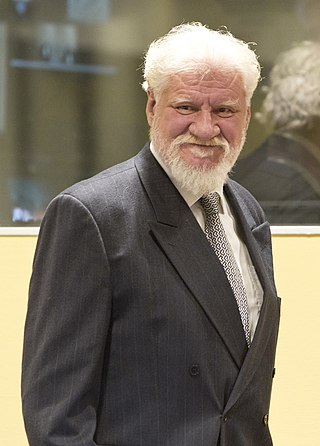
Slobodan Praljak was a Bosnian Croat who served in the Croatian Army and the Croatian Defence Council, an army of the Croatian Republic of Herzeg-Bosnia, between 1992 and 1995. Praljak was found guilty of committing violations of the laws of war, crimes against humanity, and breaches of the Geneva Conventions during the Croat–Bosniak War by the International Criminal Tribunal for the former Yugoslavia (ICTY) in 2017.
Dalibor Brozović was a Croatian linguist, Slavist, dialectologist and politician. He studied the history of standard languages in the Slavic region, especially Croatian. He was an active Esperantist since 1946, and wrote Esperanto poetry as well as translated works into the language.

The Croats of Bosnia and Herzegovina, often referred to as Bosnian Croats or Herzegovinian Croats, are the third most populous ethnic group in the country after Bosniaks and Serbs, and are one of the constitutive nation of Bosnia and Herzegovina. Croats of Bosnia and Herzegovina have made significant contributions to the culture of Bosnia and Herzegovina. Most Croats declare themselves Catholics and speakers of the Croatian language.

Predrag Matvejević was a Bosnian and Croatian writer and scholar. A literature scholar who taught at universities in Zagreb, Paris and Rome, he is best known for his 1987 non-fiction book Mediterranean: A Cultural Landscape, a seminal work of cultural history of the Mediterranean region which has been translated into more than 20 languages.
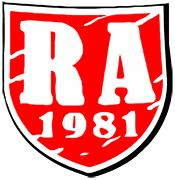
Red Army Mostar is a FK Velež Mostar supporters' group in Bosnia and Herzegovina.
Željko Ivanković is a Yugoslavian and Bosnian poet, novelist, short story writer, essayist, translator.
Serbo-Croatian is a South Slavic language that, like most other Slavic languages, has an extensive system of inflection. This article describes exclusively the grammar of the Shtokavian dialect, which is a part of the South Slavic dialect continuum and the basis for the Bosnian, Croatian, Montenegrin, and Serbian standard variants of Serbo-Croatian. "An examination of all the major 'levels' of language shows that BCS is clearly a single language with a single grammatical system."

The siege of Mostar was fought during the Bosnian War first in 1992 and then again later in 1993 to 1994. Initially lasting between April 1992 and June 1992, it involved the Croatian Defence Council (HVO) and the Army of the Republic of Bosnia and Herzegovina (ARBiH) fighting against the Serb-dominated Yugoslav People's Army (JNA) after Bosnia and Herzegovina declared its independence from Yugoslavia. That phase ended in June 1992 after the success of Operation Jackal, launched by the Croatian Army (HV) and HVO. As a result of the first siege around 90,000 residents of Mostar fled and numerous religious buildings, cultural institutions, and bridges were damaged or destroyed.

Snježana Kordić is a Croatian linguist. In addition to her work in syntax, she has written on sociolinguistics. Kordić is known among non-specialists for numerous articles against the puristic and prescriptive language policy in Croatia. Her 2010 book on language and nationalism popularises the theory of pluricentric languages in the Balkans.
The Agreement on Friendship and Cooperation between Bosnia and Herzegovina and Croatia was signed by Alija Izetbegović, President of the Republic of Bosnia and Herzegovina, and Franjo Tuđman, President of the Republic of Croatia, in Zagreb on 21 July 1992 during the Bosnian and Croatian wars for independence from Yugoslavia. It established cooperation, albeit inharmonious, between the two and served as a basis for joint defense against Serb forces. It also placed the Croatian Defence Council (HVO) under the command of the Army of the Republic of Bosnia and Herzegovina (ARBiH).
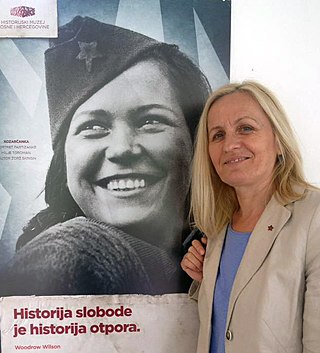
Štefica Galić is a Bosnian-Herzegovinian journalist and human rights activist. During the Croat–Bosniak War, Galić saved about a thousand people from internment in a detention camp. She is a vocal critic of nationalist politics. Since September 2019, Štefica Galić has been protected by the Bundestag.
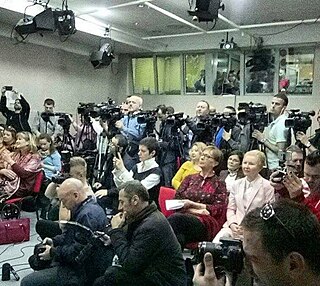
The Declaration on the Common Language was issued in 2017 by a group of intellectuals and NGOs from Bosnia and Herzegovina, Croatia, Montenegro and Serbia who were working under the banner of a project called "Language and Nationalism". The Declaration states that Bosniaks, Croats, Montenegrins and Serbs have a common standard language of the polycentric type.











